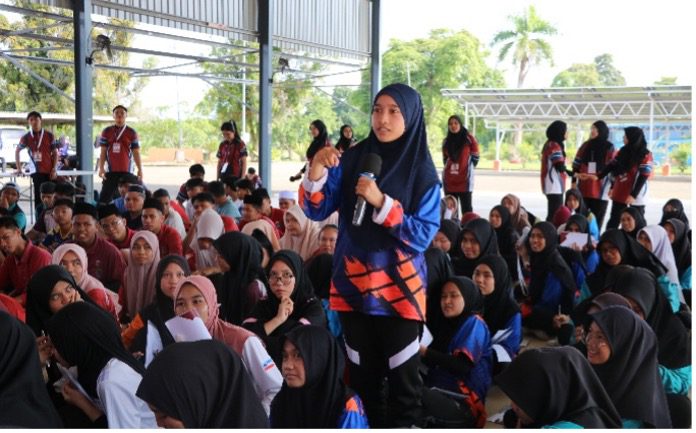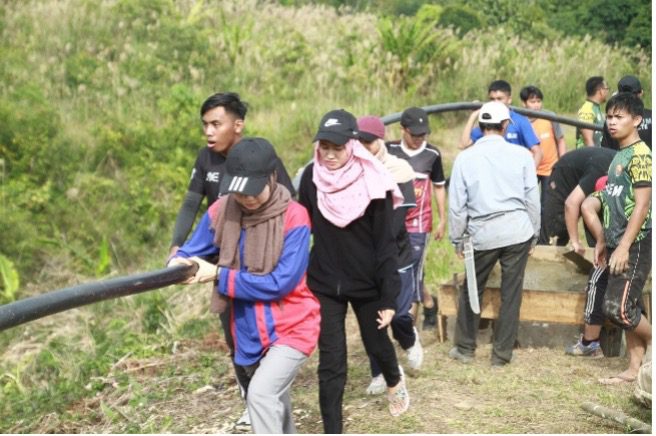Penggerak Pendaulat Borneo (Universiti Kebangsaan Malaysia)

Penggerak Pendaulat Borneo (PPB) is the Third-Place Prize winner of the MacJannet Prize for Global Citizenship 2025. This program addresses critical issues concerning basic infrastructure, specifically: 1) electricity, 2) clean water, and 3) access to education, particularly within the rural regions of Sabah and Sarawak. A persistent and significant infrastructure disparity exists between urban and rural areas in these states. According to Associate Professor Dr. Ramzah Dambul, Chief Executive Officer of the Institute for Development Studies (IDS) Sabah, access to fundamental services such as electricity, clean water, education, and mobility remains a pressing challenge for marginalized rural communities. The Sabah Renewable Energy Rural Electrification Roadmap (SabahRE2) reveals that 391 rural villages in Sabah still lack access to electricity, with residents depending largely on diesel-powered generators for basic power needs. Additionally, approximately 60% of rural areas lack access to clean water, relying instead on river water, rainwater harvesting, wells, and gravity-fed systems for daily use. In the education sector, a substantial gap remains in terms of infrastructure, resources, and digital accessibility. As reported by the Sabah State Education Department in 2024, a total of 390 schools are classified as being in poor condition and in urgent need of repair and maintenance. This widespread infrastructural neglect has contributed to Sabah recording the lowest national achievement in the Sijil Pelajaran Malaysia (SPM) examinations. It is evident that the quality of the learning environment significantly influences students’ academic performance in rural areas.
“On behalf of the Penggerak Pendaulat Borneo (PPB), I extend our heartfelt appreciation and sincere gratitude to the Talloires Network of Engaged Universities for this esteemed recognition. This award is a testament to the unwavering commitment and tireless dedication of our students, who have invested their time, energy and ideas in advancing the noble cause of social justice in rural communities. Through their efforts, PPB has worked to provide essential infrastructure electricity, clean water and access to education to marginalized communities in the remote areas of Borneo. This acknowledgment not only validates our work but also serves as a powerful motivation to continue our mission. It reinforces the confidence and support of our valued stakeholders, who have stood with us throughout this journey. As a national university born from the aspirations of the Malaysian people, UKM remains steadfast in placing community engagement at the heart of its institutional mission. We are determined to further empower the younger generation to be actively involved in contributing to the welfare and development of marginalized communities, for a more inclusive and prosperous future.”
– Mohamad Adli (Founder/Advisor, Penggerak Pendaulat Borneo, UKM)
In response to these challenges, the PPB program seeks to implement alternative and sustainable solutions to promote social justice and inclusive development for marginalized communities in rural Sabah and Sarawak. Accordingly, the program is structured around three (3) core objectives: 1) the empowerment of education, 2) the provision of alternative electricity sources and 3) the supply of clean water to rural communities in the states of Sabah and Sarawak. Established in 2016, the PPB initiative has successfully carried out its mission over nine consecutive editions, continuing into 2025. The program is organized by the Student Executive Council and is supported by Advisory Fellows, including the Principal of Kolej Dato’ Onn, the Student Affairs Office of Universiti Kebangsaan Malaysia (UKM) and the UKM Administration, which provide both administrative and financial assistance. The program’s success is also attributed to the contributions of strategic partners such as the UKM Solar Energy Institute, student representatives from Universiti Malaysia Sabah (UMS) and Universiti Teknikal Malaysia Melaka (UTeM) and various other stakeholders who have generously contributed their expertise, energy and funding.
Academic Festival

Speaker at the Academic Camp
Penggerak Pendaulat Borneo (PPB) understands the educational challenges faced by students in rural and remote areas, particularly in the states of Sabah and Sarawak. In response, PPB has organized the “Academic Festival” as an alternative approach to empower education holistically. PPB has been implemented since 2017–2025 in five districts, namely Sipitang, Tawau, Kalabakan, Semporna (Sabah) and Miri (Sarawak), involving 1,200 students from 30 secondary schools. Among the successful programs conducted are the Educational Camp, where students are introduced to the “Effective Learning Module” and the “IHSAN Development Module”. This initiative aims to equipping them with interactive and personalized learning techniques that cater to their individual strengths. By fostering structured and focused learning habits, PPB seeks to enhance students’ motivation, cognitive abilities and academic performance. Moreover, PPB is dedicated to character development through the ‘IHSAN Development Module’, which instills strong moral values grounded in Malaysian culture and religion. To further nurture students’ potential, the camp includes Leadership Development Programs (LDPs) designed to enhance communication, problem-solving, critical thinking, leadership skills and teamwork.
Additionally, “The University and TVET Admission Carnival” through exhibitions and briefings on the direction of higher education by Malaysian Public Higher Education Institutions (IPTA) and TVET Institutions. PPB has built a “Learning Centre” equipped with electricity and reading materials in Kg. Lumampau. This initiative aims to ensure that rural students have access to a wider range of reading materials and an alternative learning space to boost their motivation and academic performance. PPB carried out restoration and enhancement of the school buildings by replacing damaged wood and repainting the library at SK Long Sepiling. This initiative aims to create a conducive and comfortable learning environment for students.
Finally, PPB has supported 300 students from underprivileged families by donating school supplies such as uniforms, bags, socks, shoes, books and stationery set. This donation aims to ensure that students from middle and low-income families, receive the necessary attention. PPB collaborates with Non-Governmental Organizations (NGOs) such as Yayasan Maghfirah, Yayasan DIY and public donations to provide these essential school supplies. Through its various initiatives, PPB is making a significant impact empowers students to reach their full potential.
PPB is committed to fostering the holistic development of students that extends beyond the classroom. Through innovative programs like Educational Camp, PPB is nurturing well-rounded individuals who not only excel academically (Intelligence Quotient, IQ) but also possess strong emotional intelligence (Emotional Quotient, EQ). PPB empowers students to excel academically while also cultivating commendable character and morals. PPB believes that education is a long-term investment for the younger generation in rural areas to improve their future lives.
Provision of Electrical System

Installation of solar panels
The basic infrastructure facility of “electricity” is still a problem for communities in the rural areas of Sabah and Sarawak. PPB has initiated a project to build a “Pico-Hydro Generator” that generates three kilowatts of electrical energy. PPB also carried out wiring work for lighting to 10 houses of the residents of Kg. Lumampau. PPB expanded the project by installing “Solar Panels” in several villages, including Kg. Lumampau, Kg. Ulu Bole (Sipitang), Kg. Serudong Laut (Kalabakan), Sabah and Kg. Long Sepiling, Miri, Sarawak. A total of 22 Solar Panels, each with a capacity of 75W, were installed, along with 140 Solar Street Lamps placed around the village area as an alternative electricity source. Additionally, PPB carried out the necessary wiring to install lights and fans in 50 homes, as well as in the church, community hall, mosque and learning centre.
Installation of Water River Harvesting

Water harvesting team
The villagers do not have a primary source of clean water and rely on river water for daily activities such as cooking, bathing and washing clothes. Therefore, PPB is committed to designing a clean water supply project as the main objective of the program. PPB has implemented the “Water River Harvesting” project in Kg. Lumampau. This project utilizes river water which is stored in a storage tank and then goes through a filtration system before clean water can be distributed to the homes of villagers. Access to clean water is a basic human right and necessity for daily life. This project ensures the cleanliness and health of the villagers.
This project serves as a tangible example of the active involvement of university students in playing a significant role in supporting the development of communities, particularly marginalized groups in rural areas. Additionally, PPB has collaborated with the Institute for Development Studies Sabah (IDS) to carry out maintenance and impact audits of the previous PPB editions. This initiative is an important effort to ensure that the projects implemented by PPB continue to benefit the target communities in the long term.